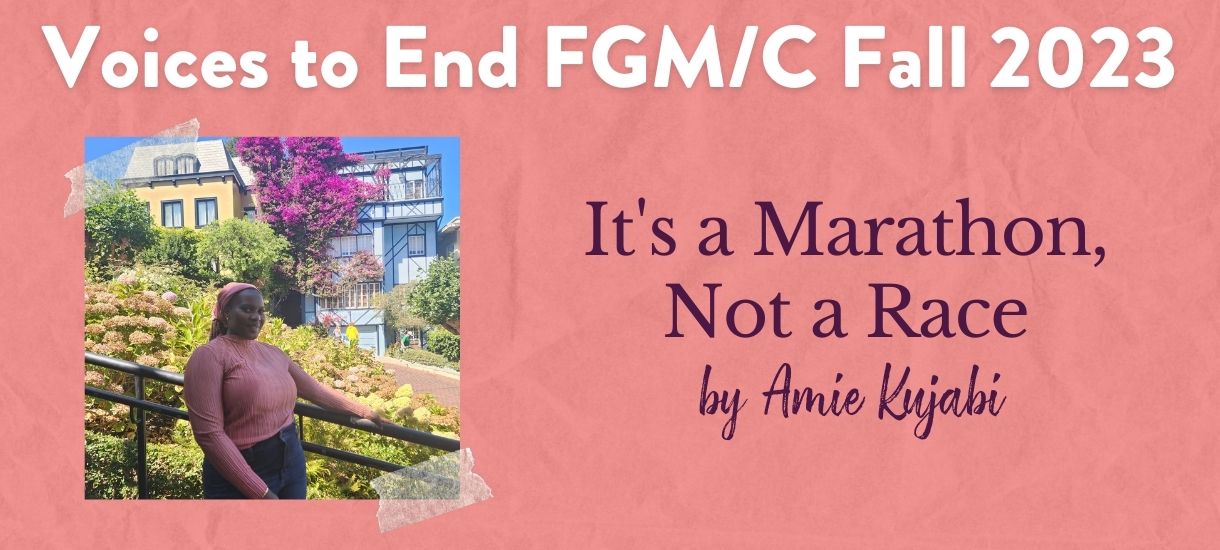By Amie Kujabi
I am an FGM/C survivor. For the past two decades, my advocacy on FGM/C has been centered around other survivors and girls at risk—but never have I shared my story. A story that shaped the trajectory of my childhood and marked the beginning of a long…long…lonely self-awareness journey to an unknown destination.
I took a bold step and shared my story as an FGM/C survivor with people outside of my close-knit circle by giving testimony during an anti-FGM/C bill hearing with policymakers in Washington State. It occurred to me that there is a need for survivors to share their unique stories to raise awareness and encourage action-oriented commitments from different stakeholders. When the opportunity to participate in the digital storytelling workshop presented itself, I challenged myself to be part of the amplified voices. Voices that not only narrate similar stories about FGM/C but also give a human face to FGM/C. In our digital world, people are moved not just by words, but also by actions and visual representation. Since FGM/C is not seldom talked about—a taboo in our communities—it was important for my story to be told in a captivating way, to change the narrative.
My digital story narrates the experiences I remember the most as a six-year-old girl who was taken to another country (Senegal) for FGM/C, under the disguise of spending summer break with my cousins and family. And so it happened: I was cut and introduced into “womanhood,” as they claimed. I later understood it as “vocational cutting” at the peak of my self-awareness journey as an adult and advocate. My story highlights the issues I faced—and I continue to struggle with. As a survivor, I struggled a lot, with my relationships growing up and in adulthood. Though this experience took me on an unknown journey, it landed me on the shores of “fighting for what is right”. That’s what propelled me into my work as a girl’s and women's rights advocate.
Everything I learned from the workshop was gold to me. I enjoyed all the sessions and the new skills I acquired in creating a digital story. From learning how to write a straight-to-the-point short story, creating and editing a digital story, being in a space with other survivors and allies, sharing our stories, and most importantly, finding support in each other. It made me feel seen and understood in my multifaceted emotions and struggles that the rest of the world may never see on a day-to-day basis. The workshop was an amazing experience, and I want more women (and others ) to be part of this great network. Together we can create more digital stories that amplify voices against this horrendous practice.
I want my story to captivate the attention of people from different walks of life. I hope that it will inspire survivors to share their stories, allies to render their support when and where it is needed, and even those on the other side of the table to finally resist this age-old tradition that harms girls. My hope is to see every state and nation have solid anti-FGM/C policies in place. I know for a fact that these laws concentrate on protecting girls at risk of being subjected to FGM/C, but I hope to see the implementation of policies that would support survivors of FGM/C as well.
I hope you will find the time to watch my short digital story. A story about a scar. A scar that my primary duty bearers believed was necessary to have in order to be labeled as the “purified” girl, for marriage, as opposed to being referred to as a “solimaa”, the uncut girl. A scar that will resemble a fresh wound for the rest of my life. Here I am today, after being silent for many years.
I now am not afraid to talk in public about stopping FGM/C. If there had been laws when I was a child, things would have been different. I was able to convince another family member to have her girls cut. And my mother is finally on board with me. But all I can think is that I failed you. I wish I didn’t have this scar. I wish you didn’t either. But we don’t have to be silent about it.
Amie Kujabi was born and raised in The Gambia, a small country in West Africa. She is very passionate about development issues, especially from a grassroots level, but also, about what development should entail at a global scale. Amie is a human rights advocate, as well as a champion for women and girls' rights and empowerment. She is also the co-founder of Think Young Women, a young women-led organization in The Gambia.
Amie is an FGM/C survivor and anti-FGM/C advocate currently residing in Washington State. As a member of the Washington Coalition to End FGM/C, Amie helped Washington become the 41st state to enact anti-FGM/C legislation. Amie is also a recent graduate of Global Development Studies and French and Francophone Studies and aspires to contribute immensely to the development of her community, state, and at the international level.

